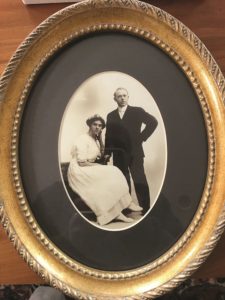PROVINCETOWN — Until her death at age 73, Bertha Mulvihill Noon had nightmares in which she heard the screams of those who went down with the luxury liner Titanic.
Mark Petteruti, co-owner of the Commercial Street shop Botanica, grew up hearing stories of “Nana Noon,” his grandmother, who survived the sinking on April 14, 1912 in the North Atlantic. Of 2,208 passengers and crew, only 712, including Noon, lived through the night.

Bertha Noon died in 1959 when Mark was just one year old and his brother, Joseph, was only 12. Fragments of her story survived with their aunts, uncles, and mother, Frances. When the pandemic shut down normal life, Joseph, now 74, a retired banker living in Rhode Island, decided to write a book about her. Mark, 63, who lives in Truro, would serve as research assistant and editor. The result is A Night She’d Remember, published by My Family Voices in 2021 and illustrated with family photos.
“She was a rock,” said Joseph of his grandmother, “a very steady person, very grounded, not flighty in any respect. She was always protective of her children and grandchildren. She wanted everything to be perfect — that was part of her PTSD.”
Researching the book, the brothers relied on historical records, family stories, and newspaper accounts that quoted Bertha’s relatives in Ireland. Bertha herself rarely spoke of the disaster to family members, though she did grant a few interviews to journalists over the years.
Mark found the best of those accounts, a 1912 Providence Daily Journal article folded into a tiny square, when he carefully examined the contents of her leather pocketbook, which had survived several family moves. The writer from the Journal found Bertha at her sister’s home about a week after the sinking.
Bertha Mulvihill was born in 1886 and raised in Coosan, County Westmeath, Ireland, the fifth of 11 children. At 19 she came to the United States to join her sister Mary in Providence. She worked as a maid and met her future husband, Henry Francis Noon, a master molder employed by Brown & Sharpe.
In 1911, before they married, she sailed back to Ireland to see her family. Months later, Bertha packed a steamer trunk with a chiffon wedding gown sewn by her sister Kitty and embroidered Irish linens. On a whim, she bought a third-class ticket on the Titanic for its maiden voyage. It cost 7 pounds, 15 shillings — the equivalent of $900 today, according to A Night She’d Remember.

Bertha traveled with two childhood friends, Maggie and Eugene Daly. They were enjoying the trip, the excellent food, and the clean, fresh rooms, according to the Petterutis’ account. On April 14 at 11:40 p.m., Maggie and Bertha had just fallen asleep in their shared cabin on the F deck, far down in the ship’s 11 levels, when a “jolt nearly knocked her out of her bunk,” the book states.
Bertha “placed her prayer book in her coat pocket,” the story continues, and grabbed three “gifts of gold” from her fiancé — a pendant watch, which she pinned to her nightgown, a necklace with a cross, and a bangle-style bracelet.
Maggie, Eugene, and Bertha made their way to the only staircase, but the stewards had locked the door, trapping the steerage passengers below. When Bertha tried to get up the stairs, a “fireman,” or guard, pushed her backwards, knocking her down. She felt her ribs crack.
When Bertha got back up, she spotted a crew member, Robert Hichens, whom she had met just hours earlier. They had fun “with dance and drink” at dinner and lots of Irish tall tales, the Petterutis write. Hichens told her the ship had struck an iceberg. He took Bertha by the arm and showed the three friends a narrow ladder in the boiler room, which the crew used to get up to the deck.
Once up top, they found the deck awash in icy water and the cold air dead still. Bertha glanced into the telegraph room, where she heard a wireless operator “weeping, weeping brokenly,” she told the Providence Journal in 1937.
Eugene, the book reports, found one lifeboat unoccupied. But before they could get in it, the pulley system failed, so the crew cut the rope and the boat plunged into the ocean. Bertha and Maggie took off their shoes, jumped overboard, and clambered into Lifeboat 15. And “then a big Italian jumped and landed on me, knocking the wind out of me,” Bertha was quoted in the 1912 interview.
For the rest of her life, Bertha suffered back pain and would lie on the cold basement floor for relief, Mark said.

The last Bertha saw of the Titanic, as she sat freezing in the crowded lifeboat, was a “mother and her five children standing there on the ship,” she told the Providence Evening Bulletin in 1958. “When the ship split in half, I saw the mother and her five children drown.”
Bertha, Maggie, and Eugene all survived, rescued by the RMS Carpathia, which the telegraph operators’ distress signals had summoned.
Joseph had heard almost none of this from his grandmother. The family knew of her nightmares, but the overall narrative was confused.
“Every aunt and uncle told us different stories,” Mark said.
Bertha was one of four Rhode Island survivors, another being Madeline Astor, the young wife of millionaire John Astor. They had a summer home in Newport.
Bertha had five children and 22 grandchildren and great-grandchildren.
She became hysterical the only other time she boarded a boat in the 47 years after the night of the disaster. It was a rowboat on a lake, and “her husband had to quickly row her back to shore,” her grandsons wrote.
A Night She’d Remember can be purchased at Botanica, 374 Commercial St. in Provincetown, and online.



